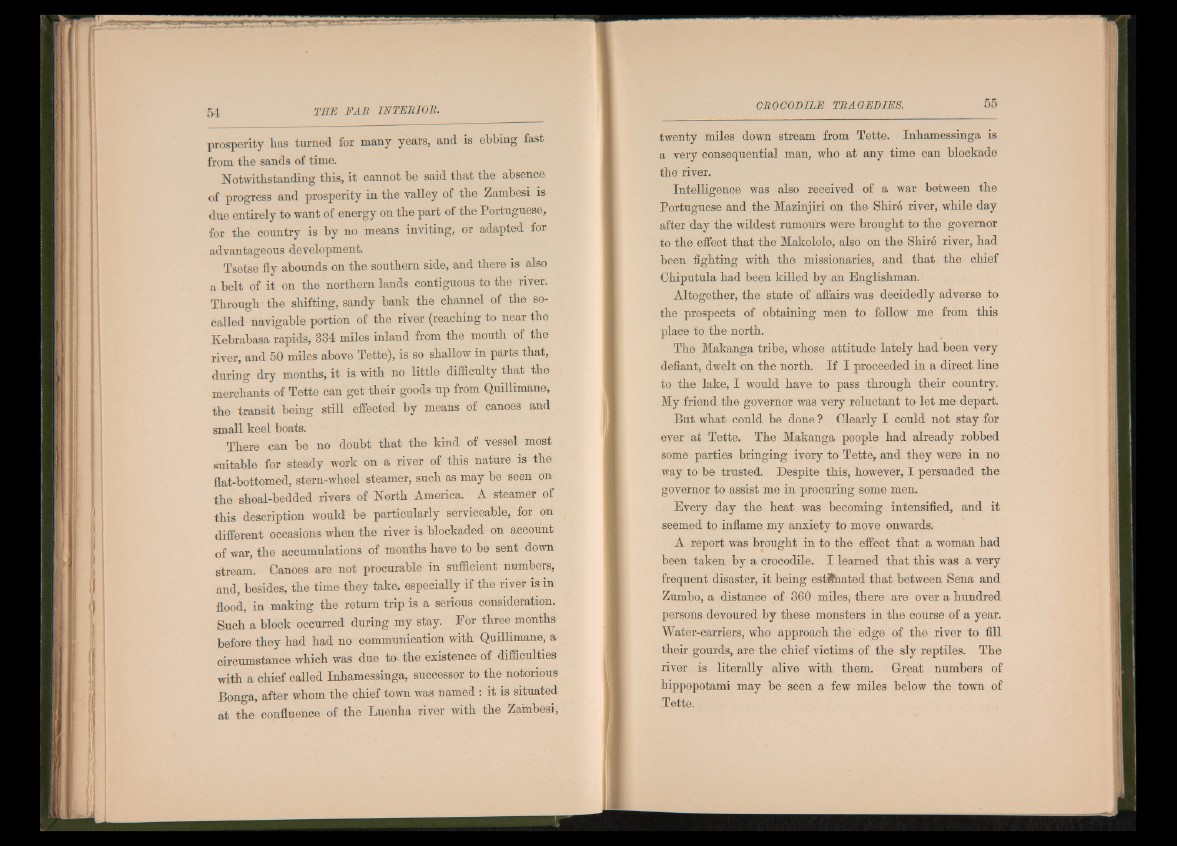
prosperity has turned for many years, and is ebbing fast
from the sands of time.
Notwithstanding this, it cannot be said that the absence
of progress and prosperity in the valley of the Zambesi is
due entirely to want of energy on the part of the Portuguese,
for the country is by no means inviting, or adapted for
advantageous development.
Tsetse fly abounds on the southern side, and there is also
a belt of it on the northern lands contiguous to the river.
Through the shifting, sandy bank the channel of the so-
called navigable portion of the river (reaching to near the
Kebrabasa rapids, 334 miles inland from the mouth of the
river, and 50 miles above Tette), is so shallow in parts that,
during dry months, it is with no little difficulty that the
merchants of Tette can get their goods up from Quillimane,
the transit being still effected by means of canoes and
small keel boats.
There can be no doubt that the kind of vessel most
suitable for steady work on a river of this nature is the
flat-bottomed, stern-wheel steamer, such as may be seen on
the shoal-bedded rivers of North America. A steamer of
this description would be particularly serviceable, for on
different occasions when the river is blockaded on account
of war, the accumulations of months have to be sent down
stream. Canoes are not procurable in sufficient numbers,
and, besides, the time they take, especially if the river is in
flood, in making the return trip is a serious consideration.
Such a block occurred during my stay. For three months
before they had had no communication with Quillimane, a
circumstance which was due to- the existence of difficulties
with a chief called Inhamessinga, successor to the notorious
Bonga, after whom the chief town was named : it is situated
at the confluence of the Luenha river with the Zambesi,
CROCODILE TRAC ED IE S. 55
twenty miles down stream from Tette. Inhamessinga is
a very consequential man, who at any time can blockade
the river.
Intelligence was also received of a war between the
Portuguese and the Mazinjiri on the Shire river, while day
after day the wildest rumours were brought to the governor
to the effect that the Makololo, also on the Shire river, had
been fighting with the missionaries, and that the chief
Chiputula had been killed by an Englishman.
Altogether, the state of affairs was decidedly adverse to
the prospects of obtaining men to follow me from this
place to the north.
The Makanga tribe, whose attitude lately had been very
defiant, dwelt on the north. If I proceeded in a direct line
to the lake, I would have to pass through their country.
My friend the governor was very reluctant to let me depart.
But what could be done ? Clearly I could not stay for
ever at Tette. The Makanga people had already robbed
some parties bringing ivory to Tette, and they were in no
way to be trusted. Despite this, however, I persuaded the
governor to assist me in procuring some men.
Every day the heat was becoming intensified, and it
seemed to inflame my anxiety to move onwards.
A report was brought in to the effect that a woman had
been taken by a crocodile. I learned that this was a very
frequent disaster, it being estftiated that between Sena and
Zumbo, a distance of 360 miles, there are over a hundred
persons devoured by these monsters in the course of a year.
Water-carriers, who approach the edge of the river to fill
their gourds, are the chief victims of the sly reptiles. The
river is literally alive with them. Great numbers of
hippopotami may be seen a few miles below the town of
Tette.